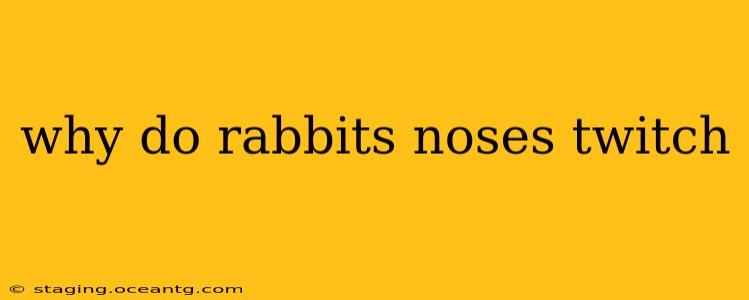Rabbits are known for their adorable, twitching noses, a characteristic that adds to their charm and captivates many. But beyond the cuteness, this constant movement serves a vital purpose. Understanding why rabbits' noses twitch unveils a fascinating insight into their sensory perception and survival strategies. This comprehensive guide delves into the science behind this intriguing behavior.
What Causes a Rabbit's Nose to Twitch?
The primary reason for a rabbit's constantly twitching nose is its incredibly sensitive sense of smell. Their olfactory system is remarkably developed, far surpassing that of humans. The twitching motion helps them actively sample and analyze the surrounding air, gathering crucial information about their environment. Think of it as their own built-in air sampler. The rapid movement of their nose brings different air molecules into contact with the olfactory receptors, allowing them to detect subtle scents that might otherwise be missed.
Is it Always the Same Speed?
The speed and intensity of the twitching can vary depending on several factors. When a rabbit is relaxed and comfortable, the twitching might be slow and almost imperceptible. However, when they detect something interesting—a potential predator, a tasty treat, or a change in their surroundings—the twitching becomes more rapid and pronounced. This heightened sensitivity allows them to quickly assess potential threats or opportunities.
How Does Their Nose Twitching Help Them Survive?
The twitching nose is a crucial survival mechanism for rabbits. It helps them in several key ways:
- Predator Detection: Rabbits are prey animals, and their ability to detect predators is vital for survival. Their sensitive noses can pick up the faintest scents of foxes, coyotes, or other predators, alerting them to potential danger long before they are visually seen. The rapid twitching enhances their ability to pinpoint the source and direction of the scent.
- Food Location: Finding food is essential for rabbits' survival. Their twitching noses help them locate sources of food, like fresh grass or vegetables, by detecting their distinctive scents from a distance. This is especially crucial in environments with dense vegetation.
- Social Communication: Rabbits communicate through scent marking, and their sensitive noses allow them to interpret these scents. The twitching motion aids in detecting subtle variations in scent, providing information about other rabbits, their territory, and their reproductive status.
Do All Rabbits Twitch Their Noses?
While the majority of rabbits exhibit this twitching behavior, the frequency and intensity can vary slightly between individuals and breeds. Some rabbits might twitch their noses more frequently than others, while some might display more subtle movements. However, the underlying mechanism remains the same – the constant movement of their nose is crucial for their survival.
Why Does My Rabbit's Nose Twitch More at Certain Times?
As mentioned earlier, the rate of twitching can be an indicator of a rabbit's emotional state. Increased twitching could indicate:
- Alertness: A heightened sense of awareness due to a perceived threat or interesting stimulus.
- Anxiety or Stress: Excessive twitching might be a sign of stress or anxiety. Observe other behaviors to confirm this.
- Excitement: A rapid twitching nose can also suggest excitement, such as when they anticipate food or playtime.
What if My Rabbit's Nose Stops Twitching?
While a constantly twitching nose is normal, a sudden cessation of twitching could be a cause for concern. It may indicate illness, injury, or stress. If you notice a significant change in your rabbit's nose twitching behavior, it's crucial to consult a veterinarian to rule out any underlying health issues. It is always best to err on the side of caution when it comes to your pet's well-being.
In conclusion, the seemingly simple act of a rabbit's nose twitching is a testament to their remarkable sensory capabilities and evolutionary adaptation. This behavior is essential for their survival, contributing significantly to their ability to detect danger, locate food, and communicate within their social environment. Understanding this fascinating aspect of rabbit behavior enhances our appreciation for these remarkable creatures.
